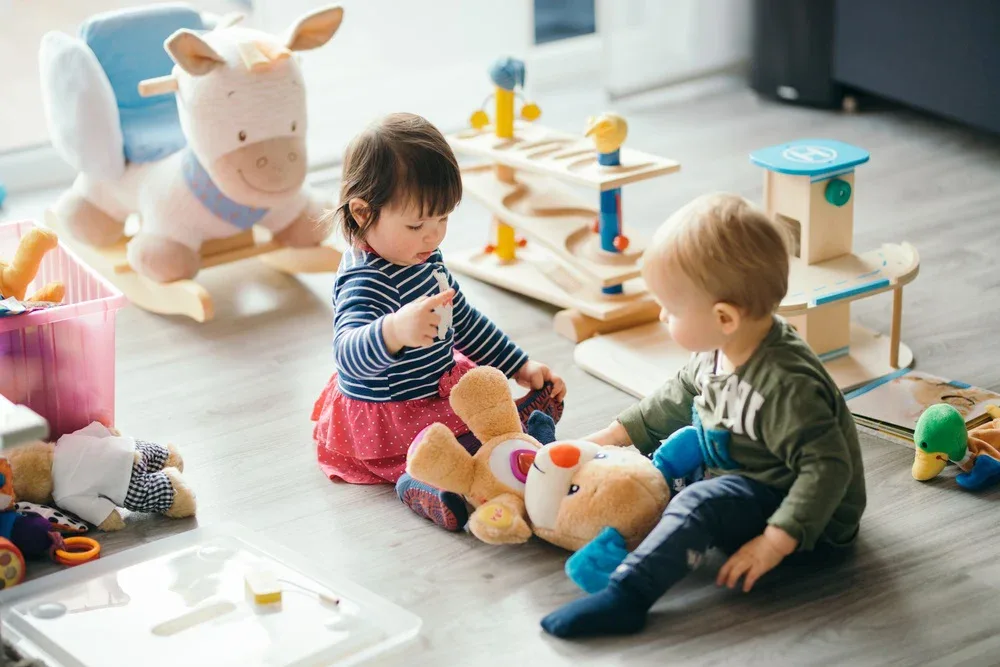
The decision to enroll a child in daycare often comes with a mix of emotions and questions, one of the most prevalent being its impact on behavior. Daycare centers offer a unique child development setting with structured routines, socialization opportunities, and educational activities. But do kids behave better at daycare?
This blog post aims to shed light on the effects of daycare on behavioral development, drawing on research findings, expert opinions, and the experiences of parents and educators. We will explore the multifaceted role daycare plays in shaping the social, emotional, and disciplinary aspects of children’s lives.
Contents
- 1 The Structure of Daycare and Behavioral Development
- 2 Social Skills and Peer Interaction in Daycare
- 3 The Role of Daycare in Emotional Regulation
- 4 Comparing Home Care and Daycare: Behavioral Outcomes
- 5 Strategies Daycares Use to Promote Positive Behavior
- 6 Parental Involvement and Its Impact on Daycare Success
- 7 Expert Opinions: What Do Child Psychologists Say?
- 8 Real-life Experiences: Parents and Educators Share Their Stories
- 9 Tips for Parents: Choosing the Right Daycare:
- 10 FAQs
- 10.1 How do I know if my child is adjusting well to daycare?
- 10.2 What should I do if my child exhibits challenging behavior at daycare?
- 10.3 How can I support my child's social development at daycare?
- 10.4 What role do peer interactions play in children's behavior at daycare?
- 10.5 How can I stay involved in my child's daycare experience?
- 11 Conclusion
The Structure of Daycare and Behavioral Development
Daycare centers provide a structured environment meticulously planned to cater to children’s developmental needs. This structure, with scheduled activities, meal times, and nap times, introduces children to a routine that fosters discipline and time management.
Such a controlled day-to-day flow can enhance behavioral development as children learn to anticipate and adapt to the structure, reducing anxiety and behavioral issues. Studies suggest that children in daycare may exhibit better self-regulation skills, thanks to the consistent routines and boundaries set in these environments.
Social Skills and Peer Interaction in Daycare
One of the undeniable benefits of daycare is the opportunity it provides for peer interaction. Unlike at home, children in daycare are exposed to a diverse group of peers with whom they learn to communicate, share, and work cooperatively.
These social interactions are critical for developing empathy, understanding social cues, and managing conflicts—skills essential for lifelong success. Furthermore, the social setting of daycare encourages children to step out of their comfort zones, fostering independence and confidence in social situations.
The Role of Daycare in Emotional Regulation
Emotional regulation is a complex skill encompassing the ability to appropriately manage and respond to emotional experiences. Daycare environments, through group activities and the guidance of trained caregivers, provide a platform for children to express, understand, and regulate their emotions.
Engaging with peers in a supervised setting allows children to encounter various emotional scenarios, from the joy of shared play to the disappointment of conflict, offering real-life opportunities for emotional learning and growth.
Comparing Home Care and Daycare: Behavioral Outcomes
The debate between home care and daycare and their impacts on behavior is ongoing. Research in this area often examines various behavioral outcomes, such as aggression, sociability, and compliance.
While some studies suggest that daycare attendees may show increased assertiveness and social skills, others raise concerns about the potential for higher aggression levels. These mixed findings highlight the importance of considering the quality of the daycare environment and the child’s individual needs when evaluating behavioral outcomes.
Strategies Daycares Use to Promote Positive Behavior
Daycare centers employ various strategies to nurture positive behavior, from positive reinforcement and reward systems to time-out methods for dealing with conflicts. These strategies are designed to encourage desirable behavior and teach children the consequences of their actions in a safe, supportive setting.
By recognizing and rewarding positive behavior, daycares reinforce the values of cooperation, respect, and kindness.
Parental Involvement and Its Impact on Daycare Success
The role of parents continues beyond the daycare door. Parental involvement in daycare activities, communication with caregivers, and reinforcement of daycare routines at home are crucial for maximizing the benefits of daycare on child behavior.
When parents and daycare providers work hand in hand, children receive consistent messages about expectations and behavior, enhancing the overall effectiveness of the daycare experience.
Expert Opinions: What Do Child Psychologists Say?
Child psychologists emphasize the significance of high-quality daycare environments offering rich play, learning, and social interaction opportunities. They point out that while daycare can offer beneficial experiences that support behavioral development, the quality of the interaction between caregivers and children and among the children themselves plays a pivotal role in determining the impact on behavior.
Personal stories from parents and educators offer valuable insights into the real-world impact of daycare on child behavior. Many parents report observing positive changes in their children’s social skills, empathy, and emotional regulation after joining daycare.
Educators, however, share success stories of children who have shown remarkable behavioral improvement through consistent routines and positive reinforcement strategies used in daycare settings.
Tips for Parents: Choosing the Right Daycare:
Choosing the right daycare is a crucial decision for parents. It’s important to look for a center that aligns with your values and offers a nurturing environment conducive to your child’s behavioral development.
Consider factors such as caregiver-to-child ratios, the educational background of the staff, the daycare’s approach to discipline, and the overall environment and facilities. Visiting the daycare, talking to staff, and connecting with other parents can provide valuable insights into the suitability of a daycare center for your child.
FAQs
How do I know if my child is adjusting well to daycare?
- Look for signs of comfort and engagement during drop-off and pick-up times.
- Communicate with caregivers to gather insights into your child’s behavior and interactions.
- Observe your child’s mood and behavior at home for any changes or indicators of adjustment.
What should I do if my child exhibits challenging behavior at daycare?
- Discuss your concerns with caregivers to understand the context and triggers of the behavior.
- Collaborate with caregivers to develop a plan for addressing the behavior, incorporating consistent strategies and positive reinforcement.
- Seek additional support or resources, such as consulting with a child psychologist or behavior specialist.
- Encourage opportunities for playdates and social interactions outside of daycare.
- Provide opportunities for your child to practice social skills such as sharing, taking turns, and resolving conflicts.
- Model positive social behaviors and effective communication techniques at home.
What role do peer interactions play in children's behavior at daycare?
- Peer interactions provide valuable opportunities for learning social skills, empathy, and cooperation.
- Positive peer relationships can reinforce desired behaviors and promote a sense of belonging and acceptance.
How can I stay involved in my child's daycare experience?
- Attend parent-teacher meetings and events organized by the daycare.
- Communicate regularly with caregivers to stay informed about your child’s progress and any concerns.
- Participate in volunteer opportunities or activities the daycare offers to engage with your child’s learning environment.
Conclusion
Daycare offers a unique blend of benefits and challenges regarding child behavior. While structured environments, peer interaction, and professional guidance can positively influence behavioral development, the ultimate impact depends on the quality of the daycare and the individual child.
Parents can leverage the benefits of daycare to support their child’s behavioral and overall development by carefully choosing the right daycare and staying engaged with their child’s care. Contact DeeCyDa Daycare today to learn more about our programs and give your child the best start in their early years.

